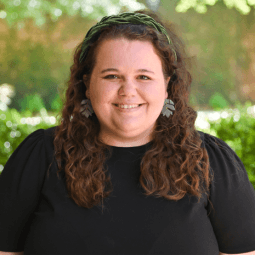May 4, 2023 | Erin Bluvas, bluvase@sc.edu
Emma Boswell was studying biological sciences at USC when she met epidemiology clinical associate professor Myriam Torres. With support from two Magellan Apprentice Grants, the Capstone Fellow worked with Torres to study the impact of sexual assault and relationship violence among teens.
This project was Boswell’s first introduction to public health and epidemiology. It also exposed her to the field in which she would focus her career: maternal and child health. The Clayton, North Carolina native had found her passion and became a Galen Health Fellow while continuing to work with Torres for the remainder of her bachelor’s program.
“I decided to attend USC for my Master of Public Health in Epidemiology degree because I had a great time here as an undergraduate and knew what a great epidemiology program the Arnold School had,” says Boswell, who received USC’s President’s Award, Outstanding Senior Award and Graduation with Leadership Distinction in Research. “I also really enjoyed all of the faculty that I got to meet as an undergraduate and wanted the opportunity to work with them as a graduate student.”
As an intern with South Carolina First Steps, Boswell worked with Arnold School alumna (Ph.D. in Epidemiology '21) and director of research and strategy Chelsea Richard as well as epidemiology clinical associate professor Linda Hazlett. Together, they evaluated the reach and impact of the agency’s home visiting programs geared toward getting children ready for school and life success.
She also became involved with the Arnold School’s Maternal and Child Health (MCH) Catalyst Program – joining the MCH Student Association, receiving a fellowship grant and completing the program’s MCH Certificate of Graduate Study. In addition to Torres, Richards and Hazlett, Boswell found mentors in MCH Catalyst Program director Jihong Liu and epidemiology assistant professor Monique Brown.
“My mentors are the reason that I was successful at USC, and I cannot thank them enough for all of the effort that they put in and how they went out of their ways to help me,” she says. “I hope that one day I will be able to mentor undergraduate or graduate public health students and have even a small fraction of the impact that they had on me.”
Boswell’s first opportunity to make an impact will come after her May graduation when she begins her new role as a research associate at the Rural and Minority Health Research Center. The Center’s work aligns perfectly with her passion for MCH, particularly adverse childhood experiences, social determinants of health, rural health, social emotional health and early childhood.
